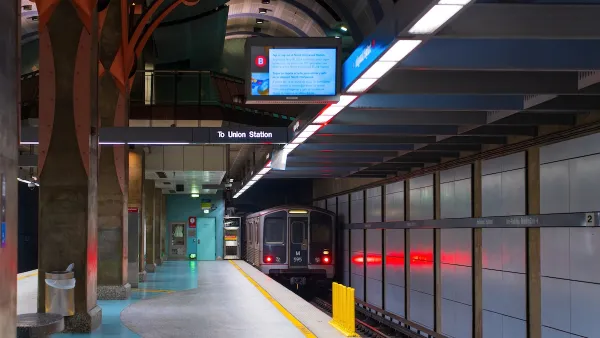The Chester Rapkin award goes to University of Oregon's Gerardo Sandoval for work on the impact of transnational communities and planning.
The Journal of Planning Education and Research annually honors the author of the best paper of the previous year with the Chester Rapkin Award. Dr. Rapkin, one of planning’s most influential scholars, made many notable contributions to the field, including coining the term SoHo in New York, pioneering research on the relationship between traffic patterns and land use, and helping to develop the 1960s Model Cities Program (Hevesi 2001).
This year’s award went to Gerardo Sandoval for his article “Shadow Transnationalism: Cross-Border Networks and Planning Challenges of Transnational Unauthorized Immigrant Communities,” (v. 33, issue 1, pp. 176-193). (Click on the link for open access until December 4, 2014.)

In Shadow Transnationalism, Sandoval posits that planners are overlooking the ways undocumented communities are shaping cities and towns, because their members inhabit the shadows not seen when only focusing on legal or regulated groups and activities. Sandoval focuses on the flow of undocumented immigrants between El Rosario, Guatemala and Potsdam, Iowa: two seemingly unrelated towns.
Welcome to Potsville from NBCLATINO
He argues these two towns, and many like them, are linked by “a network of relations that transcend the territorially bounded jurisdiction of the nation state and link together unauthorized immigrant societies of origin and settlement within socioeconomic structures intended to remain informal and actually or plausibly ‘under the radar’ and invisible” (p. 177). Thus, they represent a “Shadow Transnationalism” where recruitment, employment, production, lending, and financial networks all exist outside of the law. This transnationalism is enabled by states that send people into the shadows through regulation of migratory flows, employers who facilitate the pull of workers to jobs designed to be filled by undocumented employees, and migrants who “seek purposeful invisibility” within the system.
Potsville, Iowa a small town of 3,285, had an undocumented Guatemalan population that had grown to 800 by the late 2000s. In one ICE operation, of the 389 workers arrested, 180 were from El Rosario, Guatemala. To shed light on how El Rosario undocumented immigrants became a significant group in Postville over a short period, Sandoval documented recruitment networks, lending networks, remittance networks, and smuggling networks between the two towns. However, the networks that Sandoval documents also extend beyond the labor pipeline, to the housing and educational systems, as well as consumer economies of both towns.
This case study is an important planning contribution and worthy reading because it demonstrates how “shadow” networks create exploitive conditions resulting in unstable networks that can damage both immigrant and host communities. As a consequence, planners must think more about how “…do planners ‘plan’ in environments of un-authorization or llegality, for “illegitimate” communities?” (Sandoval 2013, 192).
Dr. Sandoval is Assistant Professor at University of Oregon’s Department of Planning, Public Policy and Management (PPPM).
Citations:
Hevesi, Dennis. “Chester Rapkin, 82, Urban Planning Theorist.” New York Times. Feb. 3, 2001.
Jones, Maggie. “Postville, Iowa, Is Up for Grabs.” New York Times. June 11, 2012. http://www.nytimes.com/2012/07/15/magazine/postville-iowa-is-up-for-gra…
Sandoval, Gerardo Francisco. "Shadow Transnationalism Cross-Border Networks and Planning Challenges of Transnational Unauthorized Immigrant Communities."Journal of Planning Education and Research(2013): 0739456X12469881.
Post Authors: Thomas Douthat and Nancey Green Leigh.

Maui's Vacation Rental Debate Turns Ugly
Verbal attacks, misinformation campaigns and fistfights plague a high-stakes debate to convert thousands of vacation rentals into long-term housing.

Planetizen Federal Action Tracker
A weekly monitor of how Trump’s orders and actions are impacting planners and planning in America.

San Francisco Suspends Traffic Calming Amidst Record Deaths
Citing “a challenging fiscal landscape,” the city will cease the program on the heels of 42 traffic deaths, including 24 pedestrians.

Adaptive Reuse Will Create Housing in a Suburban Texas Strip Mall
A developer is reimagining a strip mall property as a mixed-use complex with housing and retail.

Study: Anti-Homelessness Laws Don’t Work
Research shows that punitive measures that criminalized unhoused people don’t help reduce homelessness.

In U.S., Urban Gondolas Face Uphill Battle
Cities in Latin America and Europe have embraced aerial transitways — AKA gondolas — as sustainable, convenient urban transport, especially in tricky geographies. American cities have yet to catch up.
Urban Design for Planners 1: Software Tools
This six-course series explores essential urban design concepts using open source software and equips planners with the tools they need to participate fully in the urban design process.
Planning for Universal Design
Learn the tools for implementing Universal Design in planning regulations.
Heyer Gruel & Associates PA
JM Goldson LLC
Custer County Colorado
City of Camden Redevelopment Agency
City of Astoria
Transportation Research & Education Center (TREC) at Portland State University
Jefferson Parish Government
Camden Redevelopment Agency
City of Claremont
































